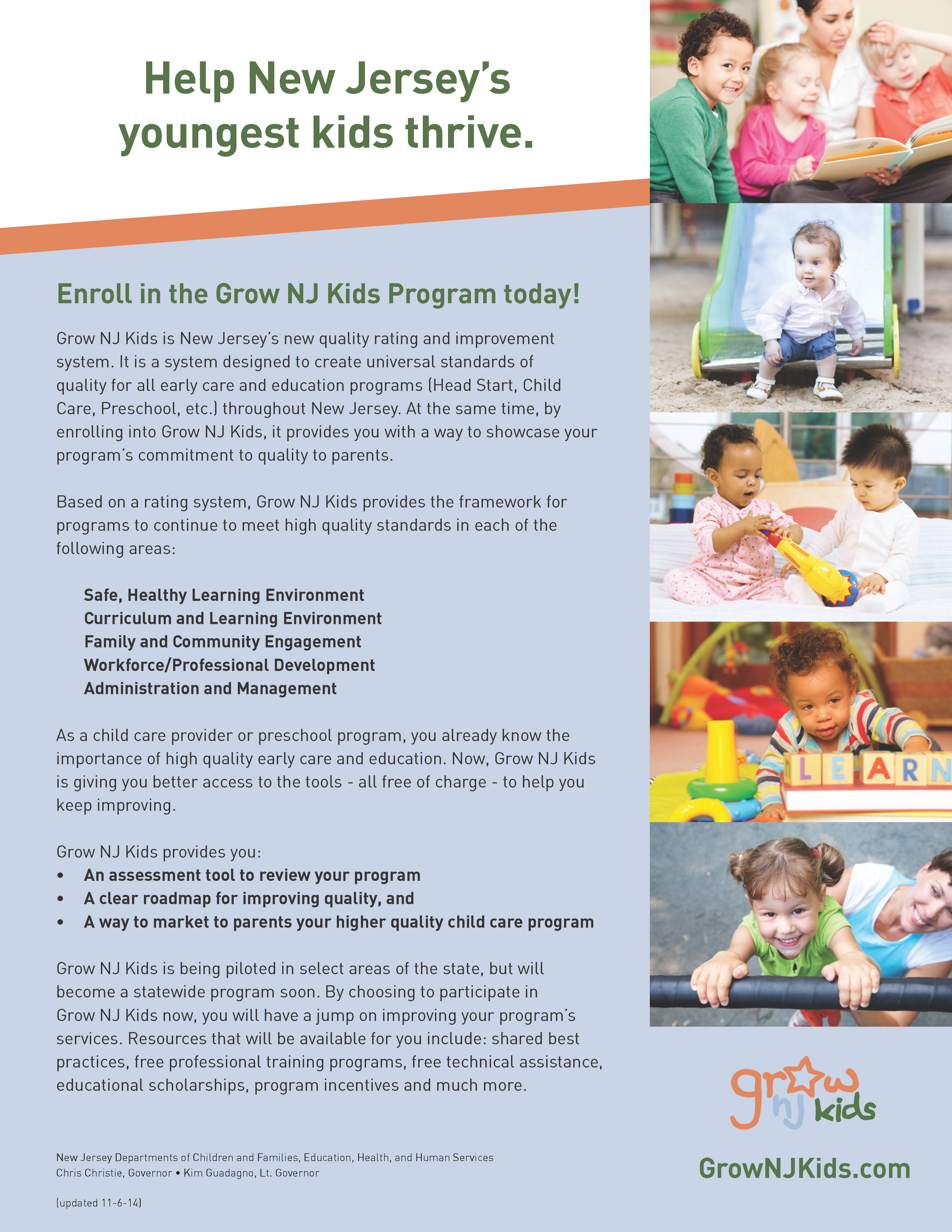
Grow NJ Kids

Enrolling in Grow NJ Kids
To enroll in Grow NJ Kids you must first join the NJ Registry
NJCCIS Registry
Thriving by Three Infant and Toddler Child Care Grant
CCDBG Grant Announcement
Grow NJ Kids
Infant Toddler Specialist Network
The Infant and Toddler Specialist Network (ITSN) uses a multi-layered technical assistance approach to efficiently support progressive movement through the framework of the ITSN. When working with an Infant and Toddler Specialist (ITS), you can expect to be involved in a collaborative process between the provider and ITS. The technical assistance, training, and all work related to improving your program are tailored to your specific needs.
For more information, please contact our Infant Toddler Specialist (ITS) Sharon Wise (swise@ulohc.org) 201-451-8888 x 209
Our Family Engagement Specialist (FES) works closely with families to share various resources and connectsthem to their local community supports:
- The FES will help families locate a quality child care program that meets their needs.
-
We partner with peer agencies to host SFI Parent Cafes`. Positive Solution sessions and Books, Balls and Blocks Events where parents can engage with their children and observe them at play through various activities. Parents can complete free childdevelopment screenings that can help track their child’s developmental milestones.
- We invite families to participate in Parent Cafés which give them an opportunity to connect with eachother, share experiences and resources, and to support and listen to other families with similarsuccesses and challenges.
Shared Service Alliance
Professional Development Training Calendar and other trainings:The Department’s Training Calendar offers a wide range of workshops in child development, curriculum planning, developmentally appropriate practices, administrative procedure, health and safety, inclusion and more.(click here for our training calendar)
CDA – (Child Development Associate (Training)
Zero to Three Growing The Brain 7 units (Training)
Virtual Lunch & Learn / Naptime (Training)
Lead Trainer (LT) Doris Ervin (dervin@ulohc.org) 201-451-8888 x194
Targeted Training Series:Our Quality Initiatives staff work together to offer a variety of Division of Family Development supported training series throughout the year. These modules focus on specific areas of child development, your program and family support.Click on a series below for additional information and descriptions:
is a research-informed, strengths-based approach that prevents child abuse and neglect by focusing on the well-being of all families and helping families identify and build on their own protective factors. Each of the protective factors is essential, but most important is what they do together to build strength and stability in families. Strengthening Families is implemented through a series of “small but significant changes” to daily practice, rather than large-scale program modifications.
The five Strengthening Families protective factors were chosen based on extensive research about children and families. These are not the only protective factors that keep families strong. They were selected because they can be built through interaction with the people and systems that families encounter in their day-to-day lives.
In Strengthening Families, all families are included, because all families need some support in building the following protective factors:
- Parental Resilience – The ability to recover from difficult life experiences, and often to be strengthened by and even transformed by those experiences.
- Social Connections – Positive relationships that provide emotional, informational, instrumental and spiritual support.
- Knowledge of Parenting and Child Development – Understanding child development and parenting strategies that support physical, cognitive, language, social and emotional development.
- Concrete Support in Times of Need – Access to concrete support and services that address a family’s needs and help minimize stress caused by challenges.
- Social and Emotional Competence of Children – Family and child interactions that help children develop the ability to communicate clearly, recognize and regulate their emotions, and establish and maintain relationships.
Child Care Development Block Grant (CCDBG) Trainings:In New Jersey, all child care and early learning programs that accept, or wish to accept, child care subsidies must comply with the requirements set forth by Child Care Development Block Grant Reauthorization (CCDBG). This includes completing the CCDBG-required trainings. These trainings are required for all licensed or registered programs including center-based programs, home-based programs and summer youth camps. For additional information, please go to http://www.childcarenj.gov/Providers/Training

